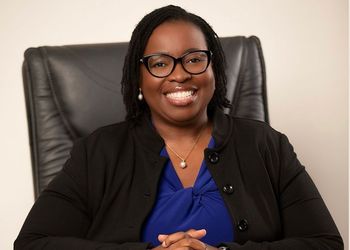A Chain of Change
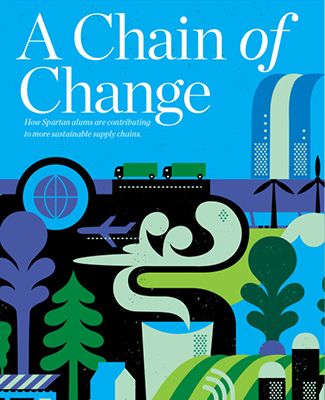
A Chain of Change
How Spartan alums are contributing to more sustainable supply chains.
November 20, 2023Ask someone in the technology sector to define the term “sustainable supply chain” and they might begin discussing conflict minerals. Pose the same question to someone in logistics and they’re likely to cite greenhouse gas emissions; in the chemical sector, they’ll point to safety and eliminating spills; and in apparel, forced labor might be the top talking point.
“One of the challenges of defining ‘sustainable supply chain’ is that it varies so widely depending on industry,” said Jason Miller, associate professor and interim chair of the Department of Supply Chain Management at MSU’s Eli Broad College of Business.
And to be certain, the supply chain is incredibly layered and complex, too. For large firms, creating a sustainable supply chain can encompass thousands of considerations ranging from internal controls like being more efficient with energy and water use to auditing suppliers–and their suppliers–to ensure responsible operations.
Though it’s challenging to rally consensus on the precise definition, there is widespread agreement that pursuing supply chain sustainability is a worthwhile endeavor, if not for the environment–the traditional target of sustainability advocates–then for the business impact, where inefficient operations hamper productivity and threaten the bottom line.
In industries around the globe, Spartans are pushing for more responsible supply chains. Empowered by a holistic understanding of sustainability in the field, and inspired to be agents of change, MSU alums are doing their part to inject sustainability into their corners of the supply chain world.
KEITH SULTANA, ’92
Senior Vice President, Global Integrated Supply Chain, Trane Technologies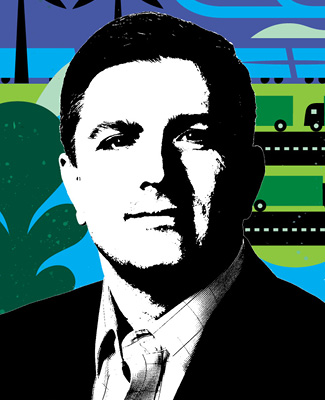
One of the world’s first companies to receive validation for a net-zero target, Trane Technologies is chasing a particularly mighty goal: to remove a gigaton–that’s a whopping 1 billion metric tons–of greenhouse gas emissions from its customers’ carbon footprints by 2030.
“A gigaton is not some trivial number,” Sultana assured, noting that a gigaton represents the annual emissions of France, Italy and the United Kingdom combined.
In tandem with Trane Technologies’ aptly named Gigaton Challenge, which includes eco-conscious measures like designing high-efficiency equipment and converting to low global warming refrigerants, Sultana is pushing the heating, ventilation, air conditioning and refrigeration manufacturing giant’s internal sustainability work.
Overseeing 42 manufacturing plants around the world while also leading logistics, procurement and other operational services at Trane Technologies, Sultana is directing sustainability-minded efforts like on-site renewable programs, vehicle fleet electrification and improved truck utilization.
Sultana is also spearheading Trane Technologies’ ambitious work to decarbonize one of the globe’s most environmentally damaging supply chains: steel, which is responsible for nearly one-quarter of the world’s industrial emissions. With its commitment to purchasing low-carbon steel, which is nearly 80% less carbon intensive, the company is helping steel mills transition from traditional blast furnaces to electric arc furnaces.
“The mills need customers so they can invest in sustainability, and we’re a prime customer here,” Sultana said, adding that Trane Technologies is now purchasing 40% of its steel from low-carbon steel vendors. “I never thought I’d be able to tell anyone I have a carbon-neutral supply chain in my lifetime, but here we are moving in that direction.”
ADAM KALMBACH, ’96
Director, Supply Chain Performance Materials, BASF Corporation
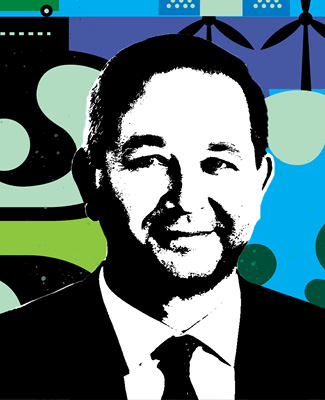 During his childhood years in suburban Detroit, Kalmbach first learned about environmental stewardship as a Boy Scout and then as an Eagle Scout. His environmental ethos was sharpened at MSU, where professors shared the “reduce, reuse, recycle” mantra and discussed cradle to grave in the supply chain.
During his childhood years in suburban Detroit, Kalmbach first learned about environmental stewardship as a Boy Scout and then as an Eagle Scout. His environmental ethos was sharpened at MSU, where professors shared the “reduce, reuse, recycle” mantra and discussed cradle to grave in the supply chain.
“That was a foundation to build upon so that I could act appropriately when I was in a position to make decisions,” Kalmbach said.
That decision-making time is now for Kalmbach.
At BASF, the world’s leading chemical company, a firm touching everything from home insulation and running shoes to hair care, Kalmbach directs supply chain operations for the enterprise’s performance materials business. He leads a team of supply chain professionals managing inventory across BASF’s North American manufacturing plants as well as its warehousing and transportation operations.
And true to form, Kalmbach infuses environmental mindfulness into the calculus of his decisions, eager to unlock strategies and practices that support business goals, workers and the environment–the so-called triple bottom line.
For example, Kalmbach is moving the transportation of some materials products–a high-spend business in the BASF ecosystem–from truck to railroad, and continues pushing efforts to use lighter, space-saving packaging to heighten efficiencies. As part of BASF’s carrier sourcing strategy, he’s researching carbon dioxide emission rates and critically evaluating partners. No potential improvement is off limits.
While there are challenges to such sustainability-driven moves, including costs and onboarding requirements like training staff on new systems and on-site capital investments, Kalmbach continues to forge ahead. He’s empowered by BASF leadership’s willingness to take risks in pursuit of improved sustainability.
“It’s not easy, but we’re getting there,” he said.
MATTHEW McKEAN, ’19
Senior Outplant Logistics Specialist, Dow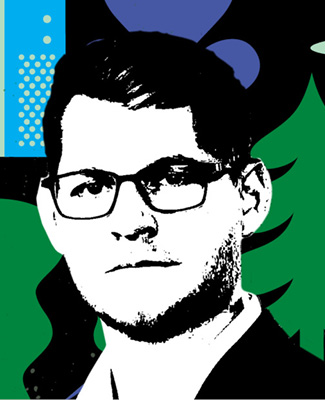
As a recent Supply Chain Management major at MSU, McKean heard a lot about sustainability in the classroom. He wondered, however, how the concept actually existed in the real world. Landing a full-time position at Dow, the materials science powerhouse that operates 31 global manufacturing sites, McKean made an energizing discovery.
“I didn’t know sustainability was this powerful of a movement,” McKean said. “It’s been exciting to jump in.”
In his primary role at Dow, McKean is a member of the supply chain improvement team in packaging and specialty plastics. Focused on service, quality and on-time delivery, he tests different supply chain design scenarios, analyzes material and risk trade-offs, and contributes to strategies optimizing supply chain infrastructure and technologies. And sustainability, he said, is front and center.
“We have targets on nature and sustainability to hit, and are empowered to find avenues to improvement,” he said.
Dow’s clear sustainability ethos inspired McKean to apply for a spot on the company’s global sustainability team, a multidisciplinary, international group of employees charged to accelerate and amplify sustainability at Dow. On that team, McKean continually contributes to decarbonization projects.
One initiative included creating user-friendly dashboards for company stakeholders to understand potential re-routing and mode of transportation options, even highlighting the environmental benefit of using one route or mode over another based on the location of warehouses and customers.
Once wondering about the earnestness of sustainability efforts at corporate enterprises, McKean has seen firsthand how sustainability and capital can work together at a formative time in his professional career.
“If we’re nice to nature, it will be nice to us in return,” he says. “That’s something I hope I can keep pushing toward.”
GREG SKROVAN, ’89
Senior Director of Global Reverse Logistics, Intel Corporation
 Skrovan leads warranty design and reverse logistics for all of Intel’s tech products, which includes overseeing product end-of-life for customer returns to Intel.
Skrovan leads warranty design and reverse logistics for all of Intel’s tech products, which includes overseeing product end-of-life for customer returns to Intel.
“Though the first goal is to avoid the return of the product completely,” Skrovan said.
When items are returned, Skrovan and his team determine how the products can be reused, something achievable about 60% of the time. Sometimes, this results in products being repurposed or resold for intentions distinct from the original intent. As one example, Skrovan recalls reselling central processing units initially created for industrial products to a customer creating smart dog tags.
“The fundamentals of the circular economy are that you want to extend the life of the product or materials at the highest value possible,” Skrovan said. “There’s a complex ecosystem out there with demand for everything.”
If items cannot be reused, then Intel pursues recycling, which happens with about 39% of returned product. That means less than 1% of product reaches a landfill.
“You can’t design a circular economy without reverse logistics,” Skrovan said. “The benefits it provides are favorable to the business and the environment.”
For Skrovan, who declared his supply chain major at MSU “as early as [he] could” and has spent his entire career in the field, sustainability has become a serious mission. He’s responsible for designing the entire warranty support and end-of-life ecosystem around all of Intel’s products. This allows him to shape the sustainability of Intel’s offerings, including how they are manufactured, shipped and recovered.
“I honestly never thought I’d be so passionate about sustainability in my supply chain career,” Skrovan said. “But I’ve increasingly seen the responsibility of supply chain management to creating a more sustainable world.”
Illustrations by Tracy Walker
Contributing Writer(s): Daniel P. Smith


